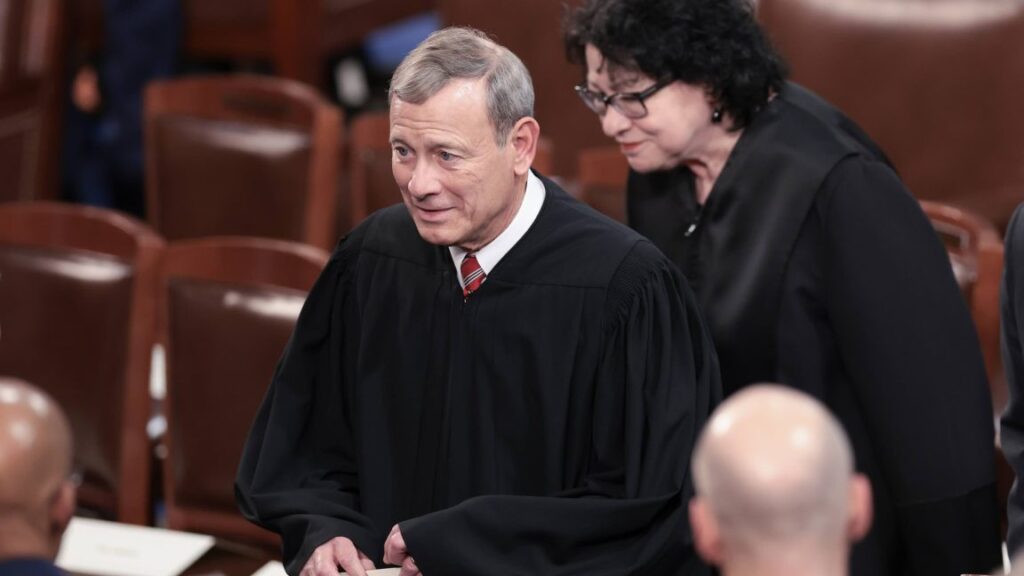Trump FTC wants Apple News to promote more Fox News and Breitbart stories
Tim Apple gets a stern letter
FTC claims Apple News suppresses conservatives, cites study by pro-Trump group.
Credit: Getty Images | Anadolu
Federal Trade Commission Chairman Andrew Ferguson has accused Apple of violating US law by suppressing conservative-leaning news outlets on Apple News.
Ferguson pointed to research by a pro-Trump group that accused Apple News of suppressing articles by Fox News, the New York Post, Daily Mail, Breitbart, and The Gateway Pundit. The FTC chair claims that Apple News might be violating promises made to consumers in its terms of service, but his letter doesn’t cite any specific provisions from the Apple terms that might have been violated.
“Recently, there have been reports that Apple News has systematically promoted news articles from left-wing news outlets and suppressed news articles from more conservative publications,” Ferguson wrote in the letter to Apple CEO Tim Cook yesterday. He said the “reports raise serious questions about whether Apple News is acting in accordance with its terms of service and its representations to consumers, as well as the reasonable consumer expectations of the tens of millions of Americans who use Apple News.”
Craig Aaron, president and co-CEO of media advocacy group Free Press, told Ars that Ferguson’s “letter would be laughable if it weren’t so dangerous. This is what government censorship looks like. Ferguson’s claims of course aren’t based on any facts or evidence, just innuendo from discredited partisan operatives who think The Wall Street Journal is too woke. Just imagine if another administration had told Drudge or Fox News what stories they should feature on their apps or home pages.”
Ferguson told Cook, “As an American citizen, I abhor and condemn any attempt to censor content for ideological reasons. Such efforts, whether taken to appease overzealous activists, at the behest of foreign governments, or simply to advance the political views of Silicon Valley elites, stifle the free exchange of ideas, manipulate the public discourse, and are inconsistent with American values.”
We contacted Apple about Ferguson’s letter and will update this article if it provides a response. Aaron said that “Apple must respond and condemn this government intrusion. Capitulating to or appeasing government censors will never work. If these companies are as committed to free expression as they claim to be, it’s time to take a stand.”
“FTC is not the speech police”
Ferguson’s letter stated that the “FTC is not the speech police; we do not have authority to require Apple or any other firm to take affirmative positions on any political issue, nor to curate news offerings consistent with one ideology or another.” But he pointed out that the FTC has power to ensure that companies do not violate promises made to consumers.
“Congress has mandated that we protect consumers from material misrepresentations and omissions, including when the product or service offered to consumers is a speech-related product,” he wrote.
Ferguson suggested that Apple News promoting liberal publications might violate the service’s terms of use, but the Apple News terms themselves mostly impose obligations on users and include nothing about avoiding partisan bias in news selection. The terms say Apple News content is presented “as-is,” and that the only recourse for someone who doesn’t like the service is to stop using it.
Whether Ferguson or anyone at the FTC carefully reviewed the Apple News terms is not clear from the letter; Ferguson says that Apple must conduct such a review. Ferguson seems to acknowledge that there would be no legal violation if Apple hasn’t made any promises to consumers about the political leanings of news sources highlighted by Apple news. Ferguson wrote:
As the Chairman of the FTC, I write to inform you of your obligations under the FTC Act. Any act or practice by Apple News to suppress or promote news articles based on the perceived ideological or political viewpoint of the article or publication, if inconsistent with Apple’s terms of service or the reasonable expectations of consumers, may violate the FTC Act. I encourage you to conduct a comprehensive review of Apple’s terms of service and ensure that Apple News’ curation of articles is consistent with those terms and representations made to consumers and, if it is not, to take corrective action swiftly.
Ferguson’s letter links to the Apple News terms. He notes that they “address a wide range of topics” related to “the content of the site, a consumer’s use of the site, prohibited conduct, privacy and data security, and dispute resolution.” But he didn’t go into any more detail.
Apple terms: “Your sole remedy…. is to stop using the site”
What do the Apple News terms say? Along with prohibiting scraping, hacking, and other conduct, the terms make it clear that users shouldn’t expect to see any particular types of content on the site or app.
“Apple does not promise that the site or any content, service or feature of the site will be error-free or uninterrupted, or that any defects will be corrected, or that your use of the site will provide specific results,” the terms say. “The site and its content are delivered on an ‘as-is’ and ‘as-available’ basis… your sole remedy against Apple for dissatisfaction with the site or any content is to stop using the site or any such content. This limitation of relief is a part of the bargain between the parties.”
The terms say that Apple News may display third-party materials and links to third-party websites, and that users must “acknowledge and agree that Apple is not responsible for examining or evaluating the content, accuracy, completeness, timeliness, validity, copyright compliance, legality, decency, quality, or any other aspect of such Third Party Materials or web sites. Apple, its officers, affiliates, and subsidiaries do not warrant or endorse and do not assume and will not have any liability or responsibility to you or any other person for any Third Party Materials or Linked Sites, or for any other materials, products, or services of third parties. Third Party Materials and links to other web sites are provided solely as a convenience to you.”
Despite Apple’s terms making no promises about the quality of third-party content in Apple News, both Ferguson and Federal Communications Commission Chairman Brendan Carr seem to think the FTC allegations against Apple are convincing. “Today I sent a letter to Tim Cook expressing my concerns about allegations that Apple News has, unbeknownst to its users, systematically promoted news articles from left-wing news outlets and suppressed content from conservative publications,” Ferguson wrote in an X post yesterday.
Carr, who has repeatedly amplified Trump’s complaints about media and threatened to revoke broadcast station licenses, wrote yesterday that “FTC Chairman Ferguson is exactly right. 🎯 Apple has no right to suppress conservative viewpoints in violation of the FTC Act.”
FTC cites bias claim from pro-Trump group
While Ferguson’s letter lacks a specific claim that Apple violated its own terms of service, there’s still Ferguson’s vague warning that bias in news aggregation may violate the FTC Act if it “is contrary to consumers’ reasonable expectations such that failure to disclose the ideological favoritism is a material omission.”
He also wrote that tech companies “suppress[ing] or promot[ing] news articles in their news aggregators or feeds based on the perceived ideological or political viewpoint of the article or publication may violate the FTC Act… when those practices cause substantial injury that is neither reasonably avoidable nor outweighed by countervailing benefits to consumers or competition.”
Ferguson said that “multiple studies have found that in recent months Apple News has chosen not to feature a single article from an American conservative-leaning news source, while simultaneously promoting hundreds of articles from liberal publications.” Both studies referred to in the letter come from the Media Research Center founded by L. Brent Bozell III, who is now US ambassador to South Africa following a nomination by President Trump.
The Media Research Center argues that “President Donald Trump and the United States appear to stand alone in the fight to preserve free expression.” Under Trump, the group says, “much is being done to correct course and loosen the Biden-era censorship cartel’s stranglehold on American liberty.”
The Media Research Center says its mission “is to document and combat the falsehoods and censorship of the news media, entertainment media and Big Tech in order to defend and preserve America’s founding principles and Judeo-Christian values.” The group’s most recent report on Apple News faults the service for highlighting articles by “leftist outlets,” which it identifies as The Washington Post, Associated Press, NBC News, The Guardian, The New York Times, Apple itself, NPR, Politico, USA Today, and Bloomberg News.
Group says Apple News needs more Breitbart
The group said its study focused on the top 20 articles in the Apple News morning edition on each day of January. It said that all of the 620 highlighted articles were from “left-leaning and other outlets.” The Media Research Center counted The Wall Street Journal as a “center outlet,” lumping it into the same broad category it applied to outlets it describes as leftist.
“Rather than promoting news stories from notable right-leaning media sources such as Fox News, the New York Post, Daily Mail, Breitbart or The Gateway Pundit, Apple News has relentlessly pushed articles from elitist media outlets that amplify the left’s narrative, like: The Washington Post, The Associated Press and NBC News as well as center outlets like The Wall Street Journal and Reuters,” the group said. The Gateway Pundit is known for publishing election-related misinformation and has been beset by defamation lawsuits.
Ferguson’s FTC has also investigated NewsGuard, a company that rates news sources on reliability. NewsGuard sued the FTC last week in an attempt to stop the probe, which it said “was instigated in large part by Newsmax.” NewsGuard said in its lawsuit that the court should also invalidate a merger condition imposed on the Omnicom/Interpublic Group deal that effectively “prohibits Omnicom and its ad agencies and affiliates from using NewsGuard’s services.”
“The FTC has pursued its campaign because Chairman Ferguson does not like NewsGuard’s news ratings, which he views as biased against conservative publications,” the NewsGuard lawsuit said. “That is wrong—NewsGuard’s ratings and journalism about news sources are non-partisan and based on fully disclosed journalistic criteria. But the FTC’s actions are plainly unconstitutional even if that were not the case. The First Amendment does not allow the government to pick and choose speech based on what it likes or dislikes.”
Trump FTC wants Apple News to promote more Fox News and Breitbart stories Read More »













